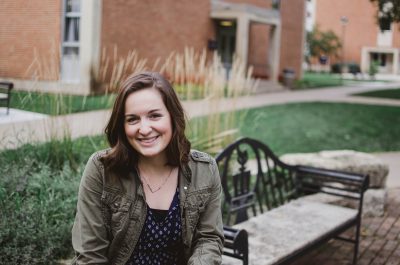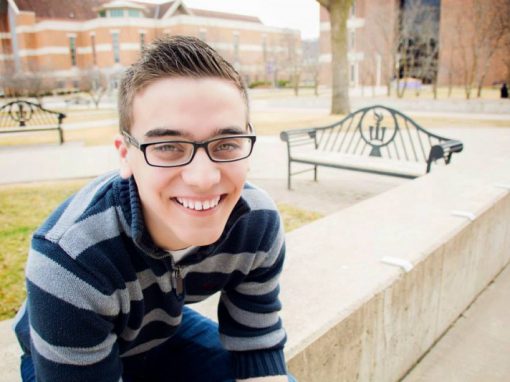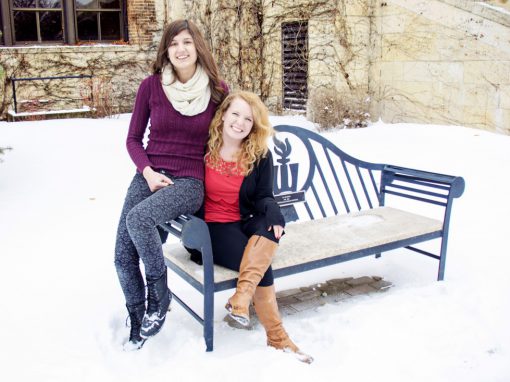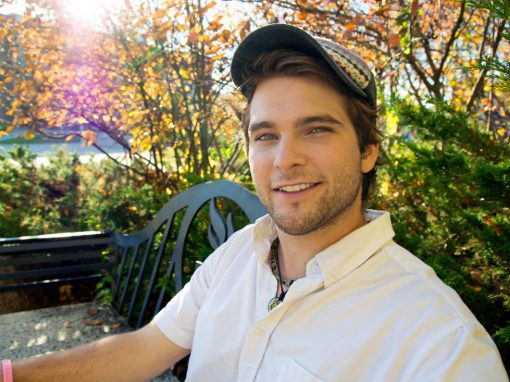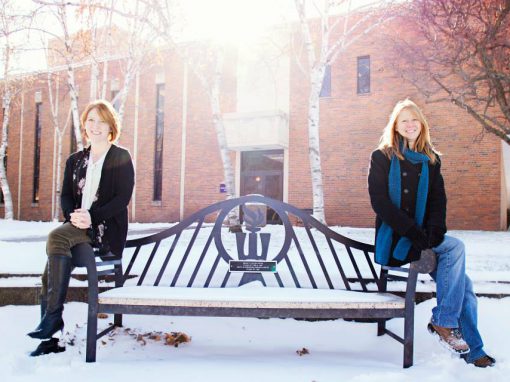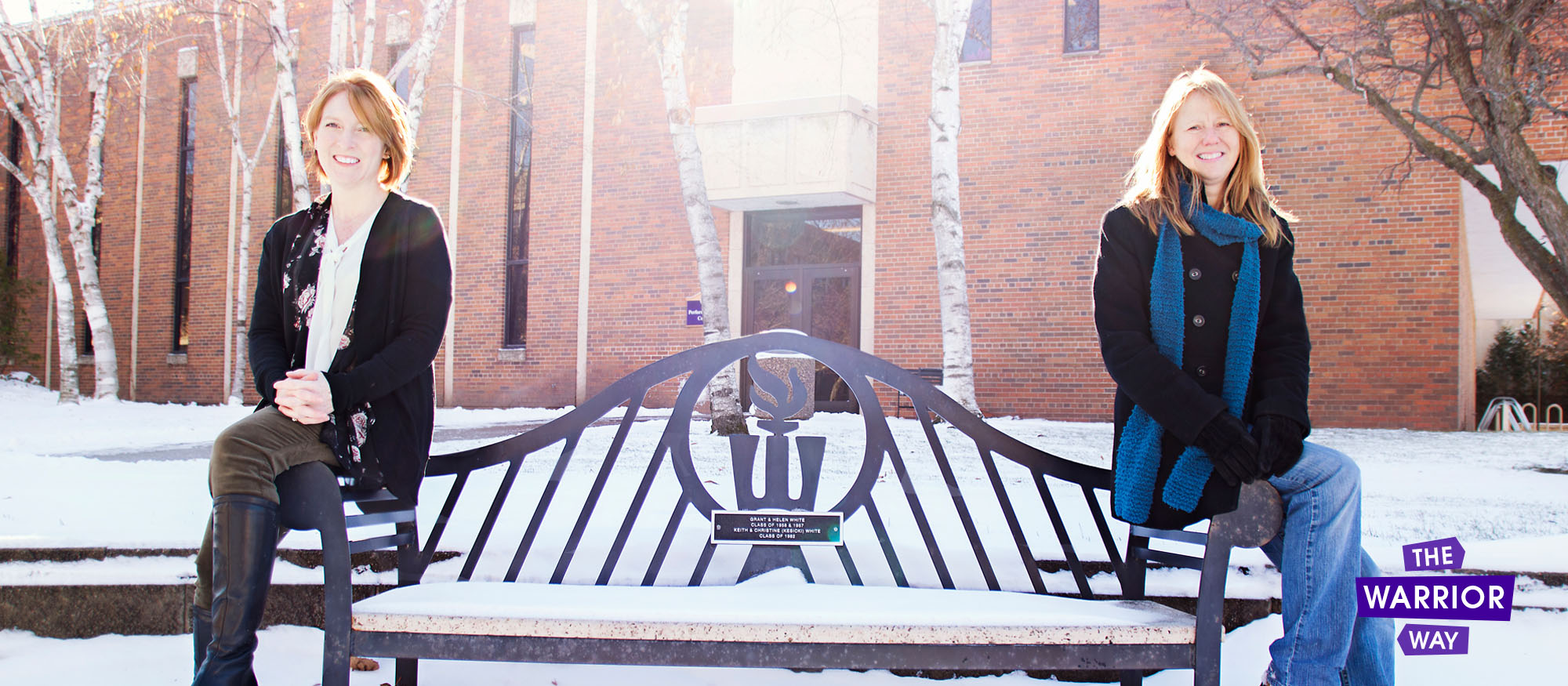
Eunie Alsaker & Jamie Sanders ’98 | Working with Grief
Eunie is from Winona, MN
WSU Counseling Services Counselor, 11 years
Jamie is a ’98 Alumni from Winona, MN
Counselor for victims of crime or loss (BS in Social Work)
“When we lose someone it changes everything: our relationships, our community, who we are and how we see the world. Often there’s not a lot of time spent talking about that change or exploring new ways of integrating the loss into your life.”
You might think that spending a Saturday thinking, speaking, writing and drawing about grief and death would be a very depressing event, but counsellors Eunie Alsaker and Jamie Sanders see it as way to heal from the loss of a loved one. That’s why they called their day-long retreat for grieving Winona area high school students a Healing Retreat rather than a Grief Retreat—and I agree with them. As they told me more about the retreat and all their creative ways of working through painful emotions, I found myself wishing that a program like this was available during the times I’d lost loved ones. Fortunately, the Healing Retreat isn’t a one-time deal. Thanks to a grant from the Elizabeth Callender King Foundation and assistance from LiveWell Winona, this Healing Retreat for teenagers was only the first in a series of retreats for people of all ages, a series that Eunie and Jamie hope will continue to grow and help those in the Winona community find peace and healing.
Tell me about the Healing Retreat. What do you do to make it happen?
Eunie: The idea began a year and a half ago when I had a conversation with a board member from the Hospice program about available support for teens after the deaths of two high school students. I knew that larger communities offer experiential one-day retreats for people who are grieving and, since I’m currently on sabbatical, I adopted this as my project for the year. Jamie and I co-facilitated the first event on Nov. 15. This day for teenagers that was very experiential in nature and provided a variety of ways for healing including artwork, journaling, yoga, physical relaxation and visualization as well as talking and listening to music.
Jamie: Right, we wanted to provide an opportunity for teens to fully experience their grief, learn some ways of integrating their grief in to their lives and be connected to others while doing it. Also, grieving has such a profound impact on our lives. When we lose someone it changes everything: our relationships, our community, who we are and how we see the world. Often there’s not a lot of time spent talking about that change or exploring new ways of integrating the loss into your life, life, and this healing retreat offers that opportunity for people.
How did the Healing Retreat go?
Jamie: Well, I saw seven heavily mourning teenagers who also had to maintain their grades to get into the college and work long hours in order afford what they or their families needed. They had lost parents, grandparents, siblings and dear friends and were stressed to the maximum in this very emotional time and not able to talk about it because as a culture we don’t want to talk about death. But here they had this great free space to talk their grief and loss. I asked them the names of the people they had lost, the teenagers appeared relieved and even excited to say those names because so often people stop talking about the people close to you. They talked a lot feeling relaxed and there certainly were connections made between teens who didn’t know each other previously. We were able to talk about other hard topics like suicide and pain but also able to laugh and find a lot of comfort and enjoyment in each other.
What is your favorite part about the Healing Retreat?
Jamie: I love connecting with people, so my favorite part was the connections we made and the connections—which came in the form of laughing, talking, honoring loved ones and being vulnerable with their emotions— the teens made with each other.
Eunie: I would have to say the same thing. In all of the work that I do, it’s the connection with another person that is the most rewarding.
What attracted you to this particular way of helping grieving teens?
Eunie: One reason we wanted to do this is because there isn’t anything like it in the community. There’s one-on-one counseling and there’s crisis-response immediately after a death, but that’s really it for teens. And we wanted to do a day-long retreat because grief does impact us on all levels and we wanted to give teens tools on emotional, physical, spiritual, social dimensions in life and be able to address their grief. I personally was interested in the topic was that I have two sons and each lost a close friend to suicide while in high school. There was a lot of support for these teens immediately, but as a parent I really wanted more so I thought “Let’s create something more.” Also, in my work at WSU, I have developed a passion over the years for young adults who have lost a family member or a close friend and are away at school. I find that that work is very inspiring for me and the connections are lasting.
How did you two decide to collaborate on this project?
Eunie: When Jamie was in graduate school, she contacted me to do an interview on how I use creative arts in counseling, so I knew she had an interest in using creative arts and I also knew of her reputation for working well with groups and teens. So those were really the three things I thought were important in a partner for this project.
Jamie: Eunie was one of many professionals I interviewed while working on my master’s thesis and we discovered we had a great connection. So when she asked me “How are you willing to help with this project?” I said “I’ll do anything and everything!”
Do you have any plans for future service projects?
Eunie: Yeah, I want to expand the Healing Retreat program. We are going to have one in February for young adults and are planning another event for teenagers in the spring. We’d also like to do one for adults, but don’t have a date yet. Because we want to continue to offering retreats, we’re looking for grants or other funding-sources so that this can continue at no cost to the participants in the community for many years to come. I want to be involved in the foreseeable future, but I’d like the program to be sustainable even after I’m no longer part of it.
Jamie: The two areas I feel most passionate about is helping people when their lives have been affected by violence or by a death. I will continue figuring out creative ways to meet people where they’re at in those circumstance and supporting them through traumatic events and helping them live wholly and the best they can. I hope to stay involved in the Healing Retreat program because it was a really rewarding experience and the one-day retreat was a creative way of providing counseling.
Who has been the biggest influence in your life?
Eunie: My parents have been the greatest influence in my life. They were very generous people even though they didn’t have a lot of money, and they valued the right things in life like relationships, time, service, family, friends—not things or money. They also were very kind people who demonstrated working to improve your community. I grew up in a small community and you really could have an impact on it. While Winona is certainly bigger, I saw a gap that overlapped with my interests and skills and I knew it was the right thing to do something about it and create these Healing Retreats.
Jamie: I’ve been really lucky to have a lot of influential people in my life. My parents really encouraged that I could make a difference in the world and that I had the abilities and confidence to help others. Having that solid nurturing throughout my life has made me able to reach out to others. But I’ve also had great professors who modeled service and giving within their professional lives, both in undergraduate and graduate classes, and I have wonderful co-workers, who have had devastating things happen in their lives and now they give back to others in similar circumstances by being police officers, victim advocates and therapists. I’m influenced by these people all the time to make sure that I am providing the best care for others who are hurting.
If you could invite anyone to sit on this bench and have a conversation, who would it be and what would you talk about?
Eunie: If I thought about it longer I might have a different answer, but who came to my mind first was my Grandpa Alsaker, whom I’ve never met. He was born in the 1800s and when he was 14 he left home to work on a fishing boat in the North Seas. Then as a young adult, he came to the US and saw tremendous change until his death in the 1950s. I think it would be fascinating to hear his stories and I’d like for him to know all that’s happened in his family, who his great grandchildren are and what they are doing. I’d also show him some of the changes in our world now, though I’m sure that all the technological advances would be hard for him to understand.
Gretchen: It’s simple for me. I’d sit down with my sister Ali, she passed away a little over two years ago and it’s certainly another reason why grief is a topic close to my heart. She died tragically and unexpectedly, so I’d like to have one more hour to laugh with her and talk with her.
Interviewed and Edited by Elizabeth Meinders ’15 and photographed by Anna Rae Butler ’15
To nominate someone in the WSU community — faculty, staff, student, alumni or friend of WSU — for Warrior Way, or if you have other feedback to share, please email Mollee Sheehan, director of web communications: msheehan@winona.edu
